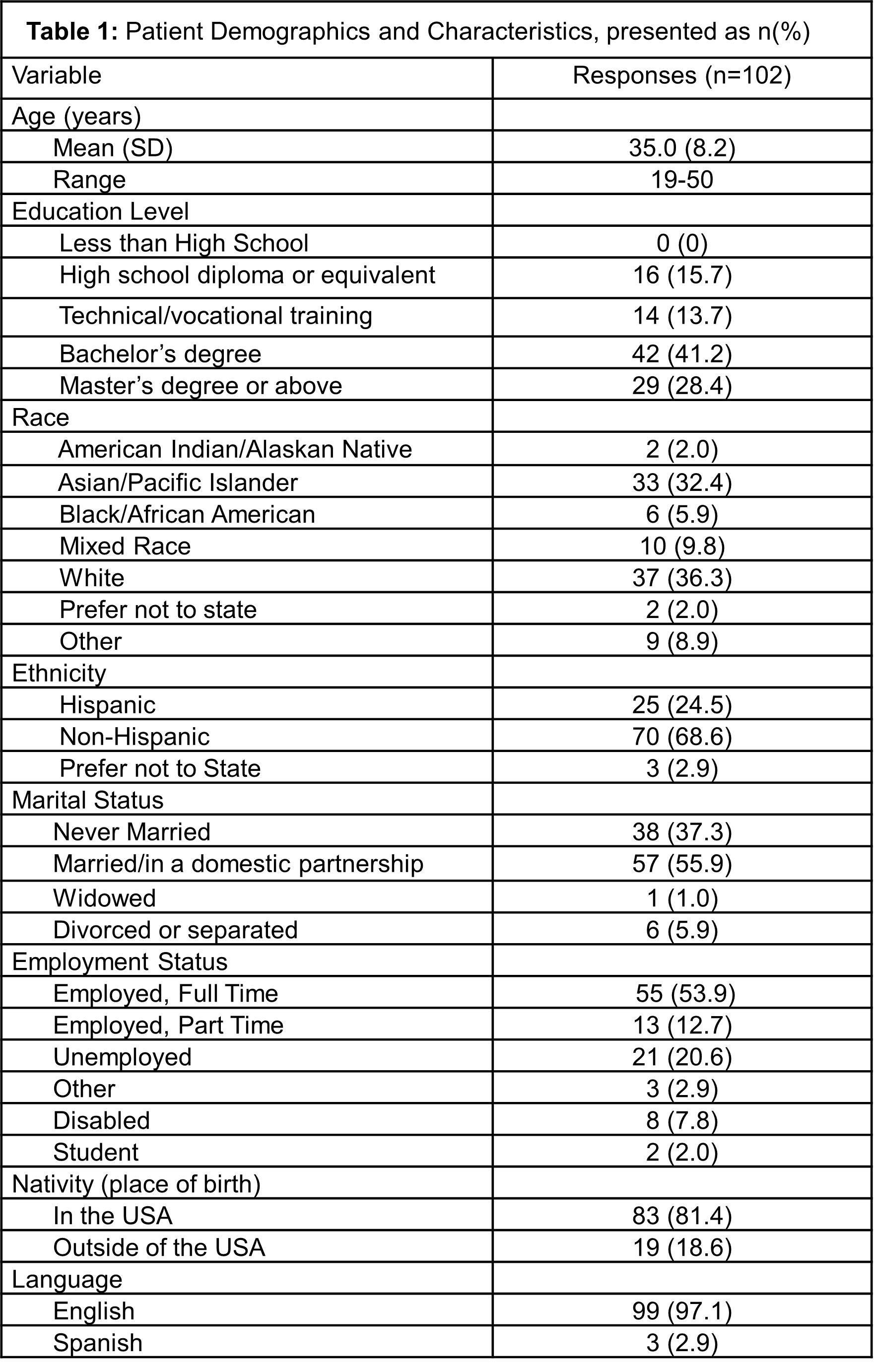Session Information
Date: Tuesday, October 28, 2025
Title: (2195–2226) Reproductive Issues in Rheumatic Disorders Posters
Session Type: Poster Session C
Session Time: 10:30AM-12:30PM
Background/Purpose: The American College of Rheumatology has established guidelines for managing reproductive health in patients with rheumatic diseases. We assessed contraception use and counseling of patients with systemic lupus erythematosus (SLE) through two parallel surveys of patients and physicians in alignment with these guidelines.
Methods: Females with SLE (ages 18-50 years) who received care from a rheumatologist at an academic medical center were invited to complete a survey assessing contraception use, including effective or highly effective contraception (EHEC), and whether they received contraception counseling from their rheumatologist. Contraception counseling was defined as: a) discussion of contraception in the past year, or b) explanation of contraception given their SLE by a rheumatologist. The survey also asked about sources of reproductive health information and perceived barriers to reproductive health counseling with their rheumatologist. The physician survey invited rheumatologists and obstetricians/gynecologists (OBGYN) to complete a survey about confidence in contraception counseling rated on a Likert-scale (1= Least Confident, 5= Extremely Confident). Rheumatologists were specifically asked about timing of contraception counseling after initiating a teratogenic medication. Descriptive statistics were summarized as frequency (n, %) or median [interquartile range]. Chi-square, Fisher’s exact, and Student’s t tests were used for bivariate comparisons.
Results: Among 102 females with SLE who completed the survey, the majority identified as White (37, 36%) or Asian/Pacific Islander (33, 32%), and had a bachelor’s degree or higher (71, 69%). Most (67, 66%) reported being sexually active and avoiding pregnancy or neutral towards pregnancy. Only 33% of all participants reported receiving contraception counseling within the past year. Fewer participants reported using EHEC (34, 33%) compared to less effective methods (47, 46%). Use of EHEC significantly differed by race (p< 0.05), with higher use among Whites (20, 54%) and lower among Asians/Pacific Islanders (7, 21%). Contraception counseling significantly differed by age, employment status, marital status, and teratogenic medication use, but these factors were not associated with the use of EHEC. Despite identifying rheumatologists as the primary source of information on SLE and reproductive health (64, 63%), many patients viewed being directed to their OBGYN as a barrier to engaging in these discussions with their rheumatologist (31, 30%).Among 200 physician respondents (rheumatologists: 116, (58%), OBGYN: 84, (42%)), rheumatologists reported higher confidence in contraception counseling (Median 4 [IQR 3–4]) compared to OBGYNs (Median 3 [3–4]). While most rheumatologists (88, 76%) reported contraception counseling at the initiation of teratogenic medications, fewer (40, 35%) reported also counseling at follow-up visits.
Conclusion: The study highlights gaps in contraception use and counseling among females with SLE. Future studies should include focus groups to identify patient, physician, and systems-level barriers to improve reproductive health delivery in SLE.
 Table 1: Patient Demographics and Characteristics
Table 1: Patient Demographics and Characteristics
.jpg) Table 2: Physician Demographics and Characteristics
Table 2: Physician Demographics and Characteristics
To cite this abstract in AMA style:
Sood A, Wise L, Sediqi S, Howren A, Moyer A, Diamond E, Chaichian Y, Simard J. Adherence to Reproductive Health Guidelines in Lupus Care: Insights from Patient and Physician Surveys [abstract]. Arthritis Rheumatol. 2025; 77 (suppl 9). https://acrabstracts.org/abstract/adherence-to-reproductive-health-guidelines-in-lupus-care-insights-from-patient-and-physician-surveys/. Accessed .« Back to ACR Convergence 2025
ACR Meeting Abstracts - https://acrabstracts.org/abstract/adherence-to-reproductive-health-guidelines-in-lupus-care-insights-from-patient-and-physician-surveys/
